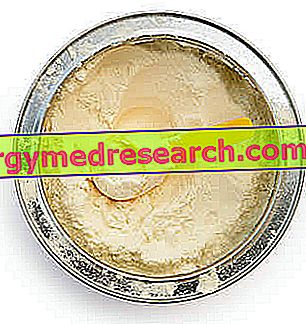Generality
Colostrum is a pre-milky fluid, produced by the mother's mammary glands in the first few days after birth.
Colostrum is a concentrate of biologically active protein factors, able to protect and nourish the fetus in the first days of life.

Hormonal-like factors, immunoglobulins, growth factors, vitamins, minerals, lipids and structural proteins are the main biologically active elements of bovine colostrum.
Precisely because of its nutritional richness, bovine colostrum has been actively employed in various clinical settings and, in recent years, also in the sports field.
Indications
Why is bovine colostrum used? What is it for?
Bovine colostrum is known above all for its immune-stimulatory and antimicrobial activity.
Although not adequately supported by clinical data, the use of bovine colostrum would seem effective in:
- Facilitate the healing of wounds and burns;
- Improve carbohydrate metabolism;
- Support the mood;
- Prevent the growth and proliferation of microbial pathogens.
Bovine colostrum is also used in sports as an ergogenic aid and as a nutritional support for muscle reconstitution.
All the aforementioned activities would be due to the presence of immunoglobulins and other biologically active proteins, such as lactofferrine and proline-rich peptides.
The use in sports, not adequately supported by clinical evidence, would seem instead justified by the ability to increase the secretion of protein factors, such as IGF1, known for important stimulatory activities against protein synthesis.
Property and Effectiveness
What benefits has bovine colostrum shown during the studies?
There is little evidence on the usefulness of bovine colostrum in the clinical setting.
Despite the strong theoretical bases, and the excellent rational use, at the moment the use of bovine colostrum would have proved clinically useful in:
- Control the proliferation of fungi such as Candida albicans ;
- Reduce the risk of diarrhea due to Cryptosporidium parvum in weak patients;
- Support the immune system, reducing the risk of infections.
On the other hand, little encouraging data would derive from pharmacokinetic studies, according to which all biologically active protein mediators, present in bovine colostrum, would be rapidly inactivated by the hostile gastric environment.
Doses and method of use
How to use bovine colostrum
The use of bovine colostrum as a supplement is facilitated by the presence on the market of powdered supplements, tablets, bars, tablets and liquid solutions.
Specific dosages have not yet been defined that can guarantee a certain reproducibility of the results.
Side effects
Although bovine colostrum is generally well tolerated, sometimes its use could facilitate the appearance of gastro-enteric reactions such as nausea, vomiting, swelling and diarrhea.
Contraindications
When should bovine colostrum not be used?
The use of bovine colostrum is contraindicated in case of lactose intolerance or allergy to cow's milk proteins.
Pharmacological Interactions
Which drugs or foods can change the effect of bovine colostrum?
Not known drug interactions are currently known.
Precautions for use
What do you need to know before taking bovine colostrum?
Given the lack of studies in this regard, the intake of bovine colostrum should be avoided during pregnancy and during the subsequent breastfeeding period.



